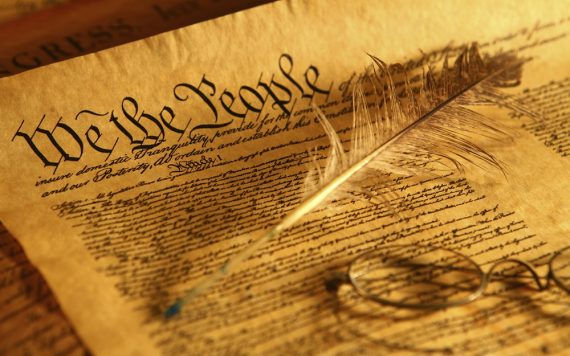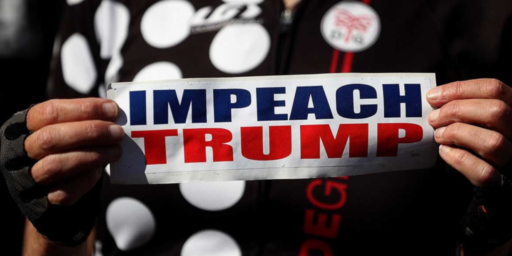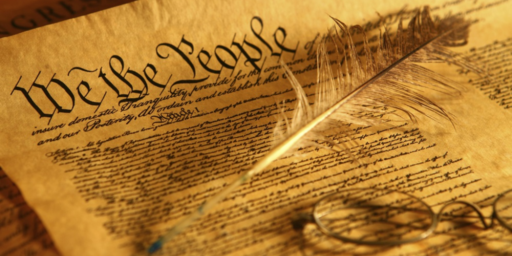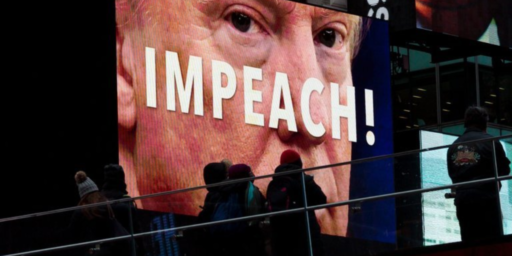An Impeachment Primer
In case anyone needs a refresher.

The place to start, as most people know, but that the broader conservation often seems to forget: “impeachment” does not mean removal from office. Rather, impeach is the process by which a formal declaration recommending removal from office is made by the House of Representatives. It is analogous to a grand jury issuing an indictment.
Article I, Section 2 states: “The House of Representatives…shall have the sole Power of Impeachment.”
Being Impeached leads to a trial in the Senate which decides whether or not removal is to take place. Removal requires a 2/3rds vote of the Senate, and if the President is being tried, the Chief Justice* presides over the trail (otherwise it is one of the few constitutionally defined duties of the VP).
Article 1, Section 3:
The Senate shall have the sole Power to try all Impeachments. When sitting for that Purpose, they shall be on Oath or Affirmation. When the President of the United States is tried, the Chief Justice shall preside: And no Person shall be convicted without the Concurrence of two thirds of the Members present.
In addition to removal, the Senate can also issue a ban against further service to the federal government (although it does not have to do so**):
Judgment in Cases of Impeachment shall not extend further than to removal from Office, and disqualification to hold and enjoy any Office of honor, Trust or Profit under the United States: but the Party convicted shall nevertheless be liable and subject to Indictment, Trial, Judgment and Punishment, according to Law.
It should be noted, as the quotation from the constitution above states, that the Senate cannot issues a criminal penalty, that is left to the criminal justice system once the officer-holder has been removed.
In teaching this process I have often referred to it as administrative in nature: it is how the federal government fires presidents and judges, for example. It is not a legal process insofar it has nothing to do with applying the laws to the actions of the office-holder in question. While the House may well impeach for “Treason, Bribery, or other high Crimes and Misdemeanors” it does not establish legal guilt in any of these matter. Indeed, the House (and the House alone) determines what constitutes “Treason, Bribery, or other high Crimes and Misdemeanors.”
Impeachment is rare. Only two Presidents, Andrew Johnson and Bill Clinton, have been impeached. Johnson came just a vote shy of removal, while Clinton was never any real jeopardy of removal. Richard Nixon would have been impeached, and likely would have been removed, had he not resigned before formal impeachment proceedings could be fully initiated.
There have been 19 impeachments total in the history of the US. Eight have resulted in removals, seven in acquittals, three in resignations, and one in dismissal of charges. Fourteen were judges (the most recent was in 2010), two were presidents, one was a cabinet secretary, and one a Senator.***
I think it is important to note that impeachment was designed as a way to limit the President from acting in a monarchical fashion. Also, the Framers thought that separation of powers would make the Congress eager to check the President. One thing that they did not count on, as I keep stressing, is the degree to which political party affiliation would bridge the institutions. This means that politicians are typically far more loyal to their party than they are to their institution. That is: congressional Republicans are far more interesting in protecting their leader in the White House than they are in protecting the Congress from Presidential malfeasance.
*Fun fact: the only reason we know that the constitution requires a Chief Justice is this passage.
**For example: Alcee Hastings was removed from his federal judgeship in 1989 and later ran for, and won, a seat in the House of Representatives (where he still serves).
***The first impeachment was of US Senator William Blount. The charges were dismissed on the grounds that the Senate expelled him before the trail.






I think that part of the problem is that institutions only go far enough to protect voters against their own stupid decisions.
Impeachment precludes pardons:
Nixon timed his resignation fortuitously.
I read this quote, charon, as preventing the president only from reversing his own impeachment. I don’t know that it prevents a president who is the subject of impeachment proceedings, but not yet removed, from continuing to grant pardons for criminal actions, perhaps even to himself (though I would argue against that authority).
The president cannot pardon an impeachment–which makes sense in a lot of ways, not the least of which is that the pardon power is for federal crimes and impeachment is not a judicial process.
An interesting predicament should impeachment be attempted. Chief Justice Roberts in implicated in the corrupt use of the FISA court as he appoints the FISA judges without challenge or confirmation.
@JKB: You really do consume a lot of right wing propaganda.
@Steven L. Taylor:
“You are what you eat” works for politics, too.
@JKB: Wait, what? That’s how FISA judicial appointments work. The judges are all sitting US District Court judges who have been confirmed to their trial court seats. FISA – a federal statute that went through the bicameral presentment process for enactment – places the appointment power in the Chief Justice. The 11 existing FISA judges were appointed by 44, 43, and 42. Their FISA court appointment is just a sort of “additional duty” to their normal judicial duties in their regular assigned courts in DC, NY, FL, VA, IL, OR, etc.
Important to note your explication of how impeachment would work IF it were pursued by the House is not the same as saying it SHOULD happen. While I think the President has committed impeachable offenses, which could be proven by a preponderance of the evidence (the standard of proof has never been defined but it’s pretty clearly preponderance based on past practice), but that the House should show restraint. 1. It’s serious business to undo an election and we should push back hard on its use as a partisan tool, as occurred with 42 in the 106th Congress. 2. The chances of removal are ZERO and mere impeachment would be viewed in the way the Clinton impeachment came to be remembered — Clinton was practically martyred and his approval rating ultimately benefitted from GOP overreach; and 3. Many people would view impeachment as trickery and chicanery, legal maneuvering to defeat the “popular will.” No, sir, this presidency MUST end at the ballot box in 2020. No one can reasonably argue that outcome.
One technique no one is talking much about yet is censure. The House can do it alone after extensive hearings, but the case never gets forwarded to the Senate. It occurs on simple majority vote. In fact, if BOTH houses were to censure, it would be a powerful rebuke to the President but wouldn’t flirt with constitutional crisis. Censure is little more than a “sense of the House/Senate” resolution that can pretty much just say “we think you suck.”
@Butch Bracknell:
Each of your points is absolutely false.
@Butch Bracknell:
Rebuttal:
https://twitter.com/HoarseWisperer/status/1120025201897607168
As impeachment is a political matter, it makes sense that the Democratic leadership in the House is thinking of whether or not to pursue impeachment in political terms…do we know for sure that it wouldn’t hurt the Democrats chances of winning the White House and Congress next year? If it resulted in Trump winning reelection, it would be the worst thing the Dems could do…
I wonder why that comment was put in the moderation queue…
@An Interested Party: You mistyped your pseudonym. Our commenting filters are set to require approval for all first-time commenters, which is defined internally by a name/email combination.
@charon:
That’s a weird assertion to make considering most of @Butch Bracknell‘s points are judgments that can’t be falsified.
This is actually two points, the first of which I agree with and the second I sort of agree with. I was a Republican partisan 20 years ago and thought Bill Clinton should have been impeached and removed. I’m no longer a Republican or a partisan and still think that. BUT, the Republican treatment of Trump indicates rather clearly that they were acting as partisans now. See especially Graham, Lindsey.
This is two points and I agree with both. There is simply no way Senate Republicans will vote to remove Trump. And, yes, the perception of Republican overreach turned Clinton from an adulterous lying scumbag into a martyr.
This is three points.
It’s simply indisputable that many would perceive a Trump impeachment as illegitimate. Hell, there are still people who think Richard Nixon was treated unjustly.
I’m torn on whether this fact means that impeachment should be abandoned. I tend to agree with Butch (and Nancy Pelosi) that Trump has committed multiple impeachable offenses and that the near-term impact of impeaching and not removing would be disastrous. But I also think there’s something to be said for signaling that Trump’s actions are simply unacceptable.
Alas, I think Butch is wrong that no one could or would dispute the outcome if Trump were to lose his re-election bid. Indeed, I fear that Trump himself would do everything in his power to delegitimate that outcome.
@charon: The Hoarse Whisperer thread makes an interesting counter-argument to the “impeachment helped Bill Clinton” narrative but I think it’s sleight-of-hand. Here’s how Gallup’s Frank Newport assessed it contemporaneously:
Here’s how Wikipedia describes it as of this morning:
@Butch Bracknell: JKB has some paranoid views about a number of institutions. He is not especially amenable to factual explanations, unfortunately.
@Butch Bracknell: This post was not a suggestion of whether impeachment should be pursued or not–it was intended to be just the basics of the process.
As I noted in a previous post, I am skeptical of pursuing impeachment.
@James Joyner:
I guess I was just triggered by his affect then, as he sure came across as someone rattling off a recitation of facts.
Correlation is not causation. Frank Newport makes his case, but in the absence of a “control” there is insufficient evidence to really know.
@charon: There’s obviously no way to run a “no impeachment” counterfactual. But we have enormous anecdotal evidence, including the aforementioned polling data. Here’s a TIME summary:
Now, Hoarse Whisperer is correct that people came away thinking Clinton was something of a dirtbag.
But, as with Trump, most people already thought that.
Interesting perspective:
Apologies to Steven Taylor for continuing off topic, but the thread is otherwise pretty dead so what the heck.
Yes, people already knew about Gennifer Flowers and Betsy-puts-down-bimbo-eruptions etc.
But as far back as Lenin and Goebbels and probably earlier, the principle of selling ideas by repetition has been known.
There lots of factors that affect approval, I still do not believe rehashing the horndog stuff was beneficial to Clinton.